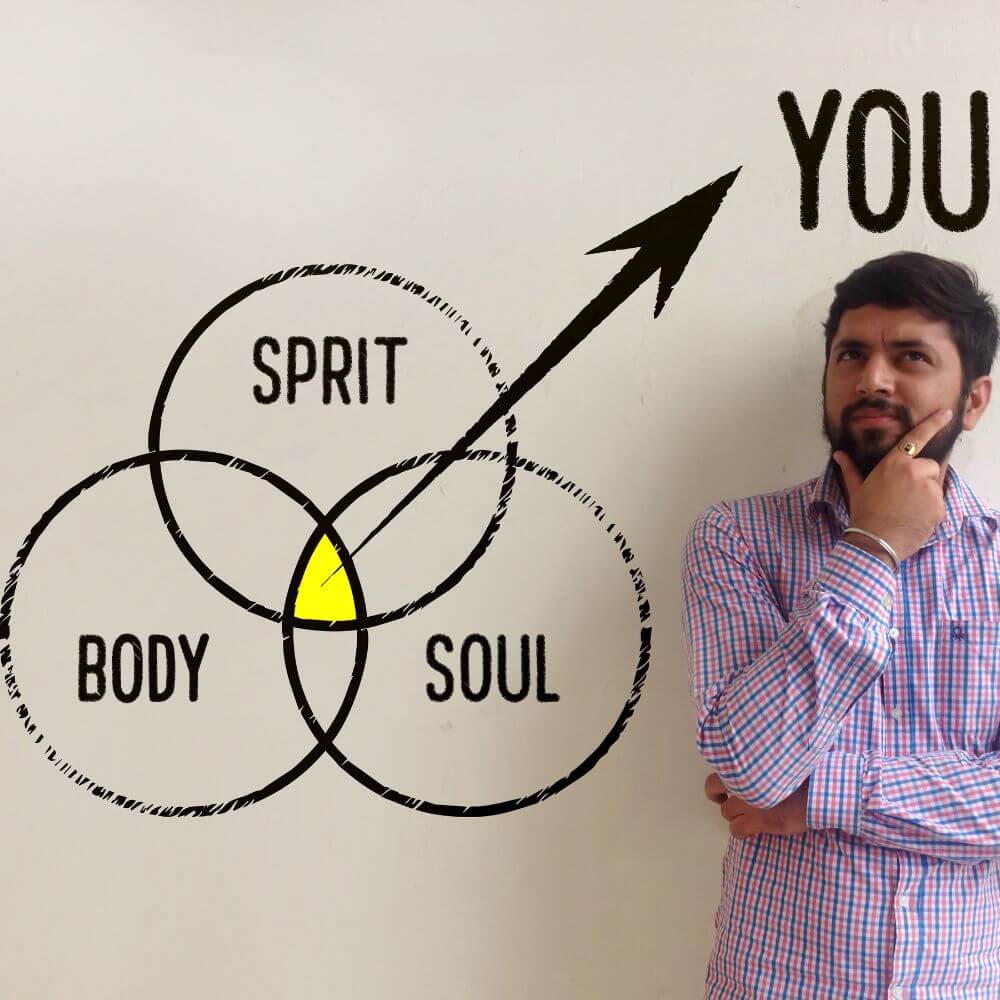The Divine Blueprint of Humanity
The question of the nature of humanity - of what makes us "us" - has been a central topic in Christianity for centuries. As Christians, we believe that humans are not just physical beings but also possess spiritual and immaterial components that distinguish us from the rest of creation. This dual or tripartite nature of humanity, also known as dichotomy or trichotomy, is a profound concept that has significant implications for our understanding of the human experience.

Defining the Concepts: Soul and Spirit
Before we delve deeper, it is essential to define our terms. The spirit and soul are often used interchangeably in casual conversations, leading to some confusion. In Christianity, however, these terms carry specific connotations.

The soul, from the Greek word "psyche," generally refers to the life force, the self, or the personality. In the most basic sense, it is that part of us that thinks, feels, and makes decisions. It encompasses our mind, will, and emotions. " (1 Thessalonians 5:23).

The word spirit, on the other hand, comes from the Greek word "pneuma," signifying breath or wind. It is usually seen as the part of us that connects and communicates with God. It's through our spirit that we are able to relate to God, who Himself is Spirit (John 4:24).
Humanity: Dichotomy or Trichotomy?
The primary debate surrounding the soul and spirit within Christian theology is whether humans are made up of two parts (body and soul/spirit – Dichotomy) or three distinct parts (body, soul, and spirit – Trichotomy).
Proponents of the Dichotomy view see these as synonymous and inseparable. They often refer to scriptures such as Matthew 10:28, where Jesus says, "Do not be afraid of those who kill the body but cannot kill the soul. Rather be afraid of the One who can destroy both soul and body in hell." In this verse, the "soul" seems to represent the entirety of our immaterial aspect.

Those advocating for Trichotomy, on the other hand, argue that the spirit and soul are different entities. Hebrews 4:12 reads, "For the word of God is alive and active. Sharper that any double-edged sword, it penetrates even to dividing soul and spirit, joint and marrow; it judges the thoughts and attitudes of the heart." This verse, they argue, indicates a clear distinction between the soul and the spirit."
"In Christian theology, the tripartite view (trichotomy) holds that humankind is a composite of three distinct components: body, spirit, and soul. It is in contrast to the bipartite view (dichotomy), where soul and spirit are taken as different terms for the same entity (the spiritual soul)". Wikipedia on Tripartite (Theology)
Unpacking the Distinctions: The Soul vs. the Spirit
Regardless of the stance one takes on Dichotomy vs. Trichotomy, it is clear that the Bible does make a distinction between the soul and the spirit in certain contexts. The soul, in its biblical usage, often denotes the whole person, their life, or their essence, while the spirit frequently signifies the non-material component that interacts with God.
The Soul: The Seat of Personality

As the seat of our personality, the soul is the aspect of our being that makes us uniquely 'us'. It includes our intellect, emotions, will, and consciousness, our capacity for thought and feeling. It's the soul that feels joy or grief, makes choices, and experiences life (Psalm 42:1-2).
The following article is a direct quote from GotQuestions.org. GotQuestions.org is my favorite "go-to" for my burning questions about Christian life.
"What Is the Human Soul?
The Bible is not perfectly clear as to the nature of the human soul. But from studying the way the word soul is used in Scripture, we can come to some conclusions. Simply stated, the human soul is the part of a person that is not physical. It is the part of every human being that lasts eternally after the body experiences death. Genesis 35:18 describes the death of Rachel, Jacob’s wife, saying she named her son “as her soul was departing.” From this we know that the soul is different from the body and that it continues to live after physical death.
The human soul is central to the personhood of a human being. As George MacDonald said, “You don’t have a soul. You are a Soul. You have a body.” In other words, personhood is not based on having a body. A soul is what is required. Repeatedly in the Bible, people are referred to as “souls” (Exodus 31:14; Proverbs 11:30), especially in contexts that focus on the value of human life and personhood or on the concept of a “whole being” (Psalm 16:9-10; Ezekiel 18:4; Acts 2:41; Revelation 18:13).
The human soul seems to be distinct from the heart (Deuteronomy 26:16; 30:6) and the spirit (1 Thessalonians 5:23; Hebrews 4:12) and the mind (Matthew 22:37; Mark 12:30; Luke 10:27). The human soul is created by God (Jeremiah 38:16). It can be strong or unsteady (2 Peter 2:14); it can be lost or saved (James 1:21; Ezekiel 18:4). We know that the human soul needs atonement (Leviticus 17:11) and is the part of us that is purified and protected by the truth and the work of the Holy Spirit (1 Peter 1:22). Jesus is the great Shepherd of souls (1 Peter 2:25).
Matthew 11:29 tells us that we can turn to Jesus Christ to find rest for our souls. Psalm 16:9-10 is a Messianic psalm that allows us to see that Jesus also had a soul. David wrote, “Therefore my heart is glad, and my whole being rejoices; my flesh also dwells secure. For you will not abandon my soul to Sheol or let your holy one see corruption.” This cannot be speaking of David (as Paul points out in Acts 13:35-37) because David’s body did see corruption and decay when he died. But Jesus Christ’s body never saw corruption (He was resurrected), and His soul was not abandoned to Sheol. Jesus, as the Son of Man, has a soul.
There is often confusion about the human spirit vs. the human soul. In places, Scripture seems to use the terms interchangeably, but there might be a subtle difference. Otherwise, how could the Word of God penetrate “even to dividing soul and spirit” (Hebrews 4:12)? When the Bible talks about man’s spirit, it is usually speaking of an inner force which animates a person in one direction or another. It is repeatedly shown as a mover, a dynamic force (e.g., Numbers 14:24).
It has been said that there are only two things that last: the Word of God (Mark 13:31) and the souls of men. This is because, like God’s Word, the soul is an imperishable thing. That thought should be both sobering and awe-inspiring. Every person you meet is an eternal soul. Every human being who has ever lived is a soul, and all of those souls are still in existence somewhere. The question is, where? The souls that reject God’s love are condemned to pay for their own sin, eternally, in hell (Romans 6:23). But the souls who acknowledge their own sinfulness and accept God’s gracious gift of forgiveness will live forever beside still waters with their Shepherd, wanting for nothing (Psalm 23:2)

The Spirit: The Divine Connection
The spirit is that part of us designed to interact with God. Romans 8:16 tells us, "The Spirit Himself bears witness with our spirit that we are children of God." This suggests that it's through our spirit that we experience a deep, personal relationship with our Heavenly Father.
Here again is a response from GotQuestions.org to clarify the spirit that lives within us:
"What is the Human Spirit?
The human spirit is the incorporeal part of man. The Bible says that the spirit of a human is the very breath of Almighty God and was breathed into man at the beginning of God’s creation: “Then the LORD God formed a man from the dust of the ground and breathed into his nostrils the breath of life, and the man became a living being” (Genesis 2:7). It is this spirit that gives us a consciousness of self and other remarkable, though limited, “God-like” qualities. It includes our intellect, emotions, fears, passions, and creativity. It is this spirit that provides us the unique ability to comprehend and understand (Job 32:8, 18).
The words spirit and breath are translations of the Hebrew word neshamah and the Greek word pneuma. The words mean “strong wind, blast, or inspiration.” Neshamah is the source of life that vitalizes humanity (Job 33:4). It is the intangible, unseen human spirit that governs man’s mental and emotional existence. The apostle Paul said, “Who among men knows the thoughts of a man except the man’s spirit within him?” (1 Corinthians 2:11). Upon death the “spirit returns back to God who gave it” (Ecclesiastes 12:7; see also Job 34:14-15; Psalm 104:29-30).
Every human being has a spirit, and it is distinct from the “spirit,” or life, of animals. God made man differently from the animals in that He created us “in the image of God” (Genesis 1:26-27). Therefore, man is able to think, feel, love, design, create, and enjoy music, humor, and art. And it is because of the human spirit that we have a “free will” that no other creature on earth has.
The human spirit was damaged in the fall. When Adam sinned, his ability to fellowship with God was broken; he did not die physically that day, but he died spiritually. Ever since, the human spirit has borne the effects of the fall. Before salvation, a person is characterized as spiritually “dead” (Ephesians 2:1-5; Colossians 2:13). A relationship with Christ revitalizes our spirits and renews us day by day (2 Corinthians 4:16).
Interestingly, just as the human spirit was divinely breathed into the first man, so the Holy Spirit was breathed into the first disciples in John 20:22: “And with that [Jesus] breathed on them and said, ‘Receive the Holy Spirit’” (Acts 2:38). Adam was made alive by the breath of God, and we, as “new creations” in Christ, are made spiritually alive by the “Breath of God,” the Holy Spirit (2 Corinthians 5:17; John 3:3; Romans 6:4). Upon our acceptance of Jesus Christ, the Holy Spirit of God joins with our own spirit in ways we cannot comprehend. The apostle John said, “This is how we know that we live in Him and He in us: He has given us of His Spirit” (1 John 4:13).
When we allow the Spirit of God to lead our lives, the “Spirit Himself testifies with our spirit that we are God’s children” (Romans 8:16). As children of God, we are no longer led by our own spirit but by God’s Spirit, who leads us to eternal life."

The Body: The Physical Vessel
While our focus is on the soul and spirit, we should not disregard the significance of the body. The Apostle Paul reminds us in 1 Corinthians 6:19-20 that our bodies are temples of the Holy Spirit. As such, we should honor God with our bodies, emphasizing the holistic view of humanity in Christian theology.

In a nutshell, what is the difference between the body, soul, and spirit in Christianity?
In Christian theology, the Bible speaks of the body as a physical vessel, the soul as a unique individuality, and the spirit as the divine nature.
Is the soul eternal?
Yes, according to Christian theology, the soul is eternal and survives the physical death of the body.
Can the soul and spirit be separated?
According to Hebrews 4:12 in the Christian Bible, the soul and spirit can be separated by the two-edged sword, the Word of God.
How does sin affect the spirit and the soul?
To repair the relationship between human beings and God, one must seek God, believe in the Lord Jesus Christ, repent for their sins, and ask for forgiveness, as sin harms this relationship.
What happens to the soul and spirit after death?
In Christian theology, the soul and spirit leave the physical body after death and face judgment before Christ.
What is the role of the Holy Spirit in the soul and spirit?
He guides and transforms the soul and spirit into a more Christ-like nature.
How does salvation impact the soul and spirit?
Salvation restores the broken relationship between God and the human soul and spirit and enables them to live with God eternally.
Can the soul and spirit be healed?
Can the soul and spirit be healed?
What does it mean to have a spiritual nature?
Having a spiritual nature means being created in God's image and having the potential to develop traits the Bible speaks of such as love, joy, peace, patience, kindness, goodness, faithfulness, gentleness, and self-control.
How can we nurture our soul and spirit in Christian theology?
We can nurture our soul and spirit through prayer, reading the Bible, attending church, serving others, and seeking guidance from spiritual mentors.

Conclusion: An Interconnected Mystery
The essence of humanity, as described in Christianity, beautifully combines the physical and the immaterial – the seen and the unseen. While we may not fully comprehend the complexities of the soul and spirit, we can appreciate the mystery and marvel at the wisdom of our Creator.
Indeed, the soul and spirit, whether viewed as distinct entities or as two facets of a single immaterial reality, ultimately point us to our need for relationship - with ourselves, with others, and most importantly, with God. As we continue to ponder these profound truths, may we find ourselves drawn closer to the One who fearfully and wonderfully made us.
References
1. Holy Bible, New International Version
2. Elwell, Walter A. (2001). "Evangelical Dictionary of Theology" (2nd ed.). Grand Rapids, MI: Baker Academic.
3. GotQuestions.org
4. Wikipedia "Tripartite (theology)
Thank you for visiting our Christian blog, and we look forward to sharing our passion for Christian theology and literature with you in future articles!









Member discussion